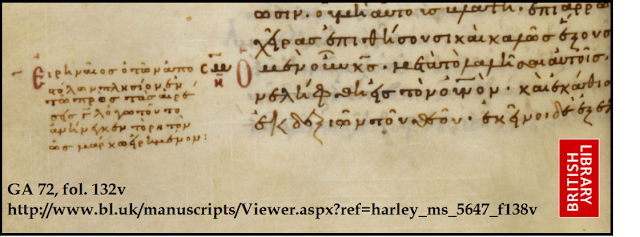Irenaeus. Ever hear of him? You won’t see his name mentioned in the NET’s
notes about Mark 16:9-20, or in footnotes about Mark 16:9-20 in the ESV, NLT,
CSB, NIV, NKJV, and NRSV. (The
footnote-makers for all these versions seem to have had a strange aversion to
mentioning patristic evidence, even when it is earlier than the earliest
extant manuscripts of the text being supplemented.) Irenaeus
was a very important patristic writer.
Born around 120, Irenaeus grew up in the city of
Irenaeus went on to serve
as a presbyter at Lyons (Lugdunum), in
As
bishop of
Irenaeus tells his readers when he
composed Book Three of Against Heresies, in chapter three, paragraph 3: it was during the same time that Eleutherius
was presiding at Rome, i.e., approximately between 174 and 189.
Irenaeus explicitly quotes Mark
16:19 in Book 3 of Against Heresies (in chapter 10, paragraph 5),
stating, “Also, towards the
conclusion of his Gospel, Mark says: ‘So then, after the Lord Jesus had spoken
to them, He was received up into heaven, and sits on the right hand of God.’” This portion of Against Heresies in extant only in Latin (as “In fine autem euangelii ait Marcus: Et quidem Dominus
Iesus, postquam locutus est eis, receptus est in caelos, et sedet ad dexteram
Dei.”
Dr.
Craig Evans, in 2013, claimed (in the Holman Apologetics Commentary) that “it is far from certain that Irenaeus, writing c. 180, was
acquainted with Mark’s so-called Longer Ending,” apparently imagining that the
Latin translator of Against Heresies
“may have incorporated this verse from much later manuscripts.” Dr. Evans is wrong. In
real life, not only is there no evidence that the Latin translation of
Book 3 has been interpolated at this point, but there is clear evidence against
the idea. Irenaeus’ use of Mark 16:19 in
Book 3 of Against Heresies is
mentioned in Greek in a marginal notation that appears in several copies of the
Gospel of Mark, including GA 1582, 72, and the recently catalogued 2954.
 |
| The margin-note about Irenaeus' quote of Mark 16:19. Viewable at the British Library's website. |
The copy of Mark
used by Irenaeus in
As a secondary point, evidence of Irenaeus’ familiarity with Mark 16:9-20 might also be found in Against Heresies Book Two, chapter 32, paragraphs 3-4 (which was quoted by Eusebius of Caesarea in Church History 5:7). Close verbal connections are lacking here (Irenaeus does not say, in Book Two at this point, that he is referring specifically to what Mark wrote; he points false teachers to “the prophetical writing”), but thematic parallels abound: Irenaeus states:
“Those
who are truly his disciples, receiving grace from him, do in his name (cf. Mk 16:17) perform
[signs], so as to promote the welfare of others, according to the gift which
each one has received from him. For some do certainly and truly drive out devils (cf. Mk. 16:17), so
that those who have thus been cleansed from evil spirits frequently
both believe, and join themselves to the church (cf. Mk. 16:16).
Others have foreknowledge of what is
to come. They see visions, and utter
prophetic expressions. Yet others heal the sick by laying their hands upon
them, and they are made whole (Cf. Mk. 16:18).
Yea, moreover, as I have said, even the
dead have been raised up, and have stayed among us for many years. And what
shall I more say? It is not possible to name the number of the gifts which
the church, throughout the whole world (cf. Mk. 16:15), has received
from God, in the name of Jesus Christ.”
Irenaeus concludes Book 2, chapter 32
(which can be read in
English at the New Advent website) by stating the the Christian church, “directing
her prayers to the Lord . . .and calling upon the name of our
Lord Jesus Christ, has been accustomed to work miracles for the
advantage of mankind, and not to lead them into error,” in contrast
to the false teachers Simon, Menander, and Carpocrates.
If there are to be English Bible-footnotes about Mark 16:9-20 (a passage which is attested in all Greek manuscripts of Mark (over 1,650) except two - GA 304 should no longer be considered a legitimate witness to the non-inclusion of vv. 9-20), they should certainly mention the testimony of Irenaeus. The present footnotes in the ESV, NIV, NLT, CSB, and NASB (to name a few), like the notes in the NET, do not give readers an accurate picture of the evidence regarding Mark 16:9-20, and, imho, seem designed (by selecting which witnesses are allowed to speak, and which witnesses are silenced) to provoke doubts about the passage. One could almost think that the footnote-writers did not want readers to know about the evidence for Mark 16:9-20 from the 100s.
